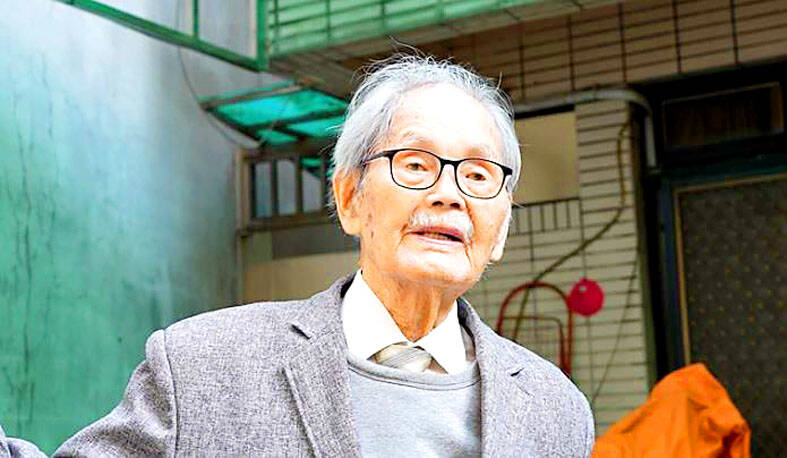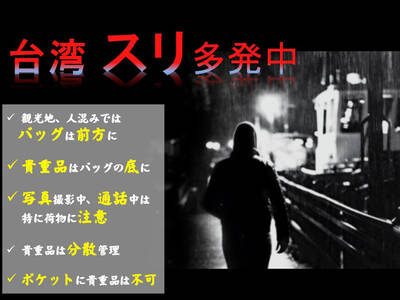As the world yesterday marked the 80th anniversary of the end of World War II, two Taiwanese shared memories of a childhood and youth marked by fear and survival under Japanese rule during the Pacific War, offering a rare firsthand glimpse into Taiwan’s role in the war.
“Some of my classmates were sent to the front lines and many didn’t survive,” said Yang Fu-cheng (楊馥成), who was born in 1922 in Tainan during the Japanese colonial era, as he recalled the harsh realities faced by his generation in an interview.
Born in a rural village with no electricity, Yang grew up amid poverty and limited opportunities, leaving him, like many of his classmates, with little choice but to serve in the Japanese military when the Pacific War broke out.

Photo courtesy of TaiwanPlus via CNA
Yang said he was relatively fortunate in being assigned to a supply unit in Singapore, where he taught locals how to grow vegetables for the military, but many Taiwanese were sent to fight in China and Southeast Asia.
By Japanese accounts, more than 200,000 young Taiwanese joined the war, either voluntarily or conscripted due to troop shortages, Yang said, but he believes the actual number was higher.
“That figure only counted those who fought in the Pacific War,” Yang said. “Even more were sent to the front lines in China as porters or to carry supplies, including people from my hometown, and many never returned. Most of these stories have gone unrecorded.”
Despite serving in a supply unit, Yang still faced danger, as Allied forces frequently targeted transport ships, sinking many in the Bashi Channel and Philippine waters, the centenarian said.
“We only learned afterward that the day before we arrived one ship had been sunk and the next day another was reported lost,” he said. “The journey from Kaohsiung to Singapore took about a week and many lives were lost along the way — so many.”
Separately, Jiang Jin-zao (江金棗), born in 1930, vividly recalled the terror of US air raids on Keelung in 1945, which were aimed at disrupting Japanese military installations and supply lines.
With no shelters near the house where she lived while working as a cook, Jiang said that during the air raids she would run to the mountains and watch the planes drop bombs on the fields below.
The B-29s came in groups of three — one at the front and two following close behind the lead plane, she said.
“The sound of the planes was deafening and it felt as if the entire sky was about to be torn apart,” she said.
One day, a plane dropped a bomb on the fields across from her and it sank into the wet soil without exploding.
“If it had gone off, we’d have had nothing to protect us and the blast could have reached us,” she said.
Seeing that kind of bombing, everyone felt a deep pain inside, but no one dared to cry out, Jiang said.
“We just watched in silence,” she said.
After an air raid that injured the pregnant landlady at her home because she could not hide under the bed, Jiang quickly packed her things and ran to her grandmother’s house.
“When she saw me at home, she hugged me and started crying, telling me not to go out to cook for money anymore,” Jiang said.
Thinking back, Jiang said the sounds of people crying were enough to make her heart feel like it would leap out of her chest.
“It was terrifying and no one dared to think: ‘Will I make it until tomorrow?’” she said.
“Humans should help one another,” Yang said. “War is unnatural. Even animals help each other; why then do we, who can reason and feel, choose to fight?”

GENSLER SURVEY: ‘Economic infrastructure is not enough. A city needs to inspire pride, offer moments of joy and foster a sense of belonging,’ the company said Taipei was named the city with the “highest staying power” in the world by US-based design and architecture firm Gensler. The Taiwanese capital earned the top spot among 65 cities across six continents with 64 percent of Taipei respondents in a survey of 33,000 people saying they wanted to stay in the city. Rounding out the top five were Vietnam’s Ho Chi Minh City (61 percent), Singapore (59 percent), Sydney (58 percent) and Berlin (51 percent). Sixth to 10th place went to Monterrey, Mexico; Munich, Germany; Sao Paulo, Brazil; Vancouver; and Seoul. Cities in the US were ranked separately, with Minneapolis first at

The Japan-Taiwan Exchange Association has cautioned Japanese travelers to be vigilant against pickpockets at several popular tourist spots in Taiwan, including Taipei’s night markets, the Yongkang Street area, Zhongshan MRT Station, and Jiufen (九份) in New Taipei City. The advisory, titled “Recent Development of Concerns,” was posted on the association’s Web site under its safety and emergency report section. It urges travelers to keep backpacks fully zipped and carried in front, with valuables placed at the bottom of the bag. Visitors are advised to be especially mindful of their belongings when taking photos or speaking on the phone, avoid storing wallets and

Scoot announced yesterday that starting in October, it would increase flights between Taipei and Japan’s Narita airport and Hokkaido, and between Singapore and Taipei. The low-cost airline, a subsidiary of Singapore Airlines, also said it would launch flights to Chiang Rai in Thailand, Okinawa and Tokyo’s Haneda airport between December and March next year. Flights between Singapore and Chiang Rai would begin on Jan. 1, with five flights per week operated by an Embraer E190-E2 aircraft, Scoot said. Flights between Singapore and Okinawa would begin on Dec. 15, with three flights per week operated by Airbus A320 aircraft, the airline said. Services between Singapore

ENDORSING TAIWAN: Honduran presidential candidate Nasry Afura said that Honduras was ‘100 times better off’ when it was allied with Taipei The Ministry of Foreign Affairs yesterday said it would explore the possibility of restoring diplomatic relations with Honduras based on the principle of maintaining national interests and dignity. The ministry made the remarks in response to reporters’ questions regarding an article titled: “Will Taiwan Regain a Diplomatic Ally?” published in The Diplomat on Saturday. The article said Honduras’ presidential election in November could offer Taiwan the chance to regain an ally, as multiple candidates have promoted re-establishing diplomatic relations with Taiwan. Honduras severed diplomatic ties with Taiwan in March 2023 in favor of Beijing, but since switching its diplomatic recognition,